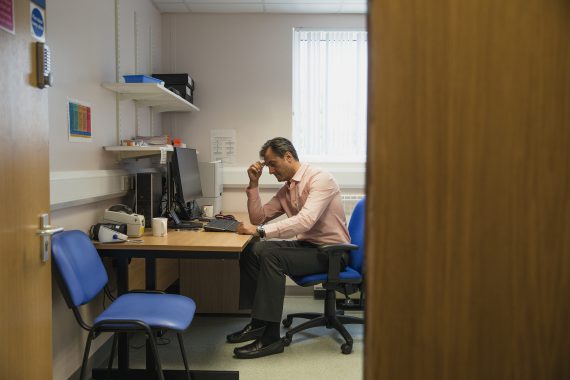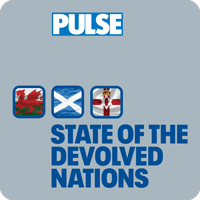‘Northern Ireland is at risk of losing GPs to the Republic’


In a series of articles on the state of general practice in the devolved nations, Jenny Gibson explores the challenges facing GPs in Northern Ireland
Like GP practices across the UK, Northern Ireland loses much-needed medical professionals to Canada, New Zealand and Australia.
But the country is also unique in having greener grass much closer by. Doctors can easily pursue careers in the Republic of Ireland – and some of them live close enough to the border that they don’t even have to move house.
With the North’s combined woes of continued under-resourcing, spiralling workloads and no functioning government, GP leaders fear more and more GPs will be looking to make the move.
Dr Alan Stout, chair of the GPC in NI, says: ‘Our biggest risk is that we lose people to the Republic. You only need to go 100 yards and you’re in a different jurisdiction with better pay, terms, conditions, and everything else.’
Government figures also show that while the number of GPs in Northern Ireland have gone up from 1,323 in December 2017 to 1,433 at the end of last year, around 20% of them are currently aged over 55. And a lack of GP trainees means there are not coming into the system to meet the loss at the end. Meanwhile there has been an increase in the average numbers of patients per practice from 5,865 to 6,394 over the same period.
RCGP NI council chair Dr Ursula Mason warns that there are ‘simply not enough’ GPs in the country to meet the ‘escalating demand for primary healthcare’ and says GP trainee numbers are a major problem.
GP training places in Northern Ireland were upped by 10 to 121 as a one-off last year, but as there is currently no minister to push for another increase – ideally to 131 for 2023/24 – the profession could even see the number dropped again.
‘The reality is that even 121 is still far short of where we need to be. But it was a one-off increase of 10 and there was no go-ahead for that to be a recurring thing, so the decision now lies with the permanent secretary…,’ says Dr Mason.
She adds: ‘With a government and minister in place, there would have been a real push to increase it this year to 131 because we know that we need to get somewhere in the region of 161 to maintain the status quo. But the really frustrating thing for GPs would be that that number drops back to 111, because that would be sending out a real indictment about how the system view the value of general practice and ensuring there is an adequate workforce.’
Meanwhile, medics are working ‘harder and harder’ according to Dr Mason, leading to ‘increased burnout’ and a desire to retire or quit.
The BMA in NI has proposed crisis solutions to health officials including a cost-neutral contract freeze, funding indemnity costs in line with rest of the UK and full roll out of multi-disciplinary teams – a project that has been ongoing for six years now.
But progress remains limited. Dr Stout says: ‘Outside of GP numbers, we need our MDTs rolled out…We don’t have a full rollout of the MDTs and the vast majority of practices still have nobody additional. We’ve got a couple of areas that have full MDTs but nowhere near every area.’
A newly-implemented 4.5% pay rise for medics across the devolved nations – well below NI’s inflation rate – has also been criticised by the profession as not enough.
‘Every practice will prioritise giving it to every staff member, but it’s likely to result in a pay cut to GPs, because we’re paying all the other bills, including electricity and gas,’ says Dr Stout.
He cites increases to minimum wage and National Insurance as further strains on funds, while Dr Mason points out the ‘increasing asks’ of secondary care leading to all-round under-resourcing.
There has been some assistance coming through, including a £5.5m package to support NI GPs announced last autumn, cost of living help for medical students and streamlined recruitment processes for overseas GPs. The option to ask for a freeze in QOF reporting was also confirmed.
But general practice in Northern Ireland is buckling. There have been 13 contract hand backs in the last 12 months alone and amid the current pressures, more seem inevitable. And those GPs working on the frontline are beaten down: ‘[Morale] is terrible. It is really, really low,’ says Dr Stout.
‘The pressures and demand are so great, and they do feel that they are doing above and beyond. There’s no question that the political situation has an impact [as well], because they just don’t see people there to help them.’
Dr Mason agrees, but adds: ‘As always, GPs are very flexible and innovative individuals. Given some support, there are things that can be done to help keep general practice afloat, until longer term solutions can be put in place.’
*A spokesperson for the Department of Health Northern Ireland told Pulse that quality-assured working patterns are currently unavailable for active GPs, therefore headcount is the measure used in published official statistics on GP numbers. They added that unpublished information suggests that the 20% increase in headcount is not replicated in terms of whole-time equivalent (WTE) GPs, but this is unvalidated.









